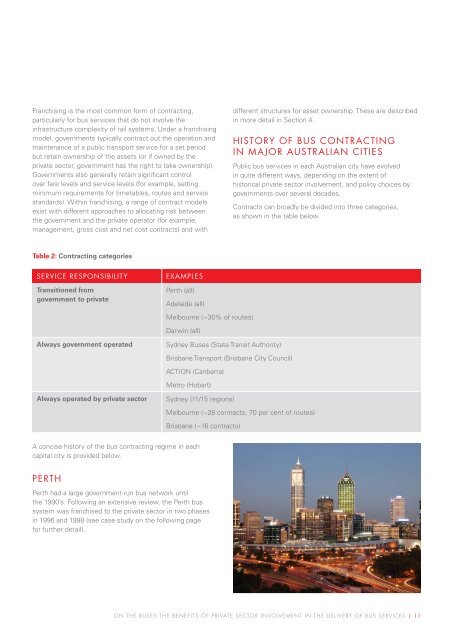ON THE BUSES
TTF-On-The-Buses-Report-2016
TTF-On-The-Buses-Report-2016
You also want an ePaper? Increase the reach of your titles
YUMPU automatically turns print PDFs into web optimized ePapers that Google loves.
Franchising is the most common form of contracting,<br />
particularly for bus services that do not involve the<br />
infrastructure complexity of rail systems. Under a franchising<br />
model, governments typically contract out the operation and<br />
maintenance of a public transport service for a set period<br />
but retain ownership of the assets (or if owned by the<br />
private sector, government has the right to take ownership).<br />
Governments also generally retain significant control<br />
over fare levels and service levels (for example, setting<br />
minimum requirements for timetables, routes and service<br />
standards). Within franchising, a range of contract models<br />
exist with different approaches to allocating risk between<br />
the government and the private operator (for example,<br />
management, gross cost and net cost contracts) and with<br />
different structures for asset ownership. These are described<br />
in more detail in Section 4.<br />
HISTORY OF BUS C<strong>ON</strong>TRACTING<br />
IN MAJOR AUSTRALIAN CITIES<br />
Public bus services in each Australian city have evolved<br />
in quite different ways, depending on the extent of<br />
historical private sector involvement, and policy choices by<br />
governments over several decades.<br />
Contracts can broadly be divided into three categories,<br />
as shown in the table below.<br />
Table 2: Contracting categories<br />
SERVICE RESP<strong>ON</strong>SIBILITY<br />
Transitioned from<br />
government to private<br />
EXAMPLES<br />
Perth (all)<br />
Adelaide (all)<br />
Melbourne (~30% of routes)<br />
Darwin (all)<br />
Always government operated<br />
Sydney Buses (State Transit Authority)<br />
Brisbane Transport (Brisbane City Council)<br />
ACTI<strong>ON</strong> (Canberra)<br />
Metro (Hobart)<br />
Always operated by private sector<br />
Sydney (11/15 regions)<br />
Melbourne (~28 contracts, 70 per cent of routes)<br />
Brisbane (~16 contracts)<br />
A concise history of the bus contracting regime in each<br />
capital city is provided below.<br />
PERTH<br />
Perth had a large government-run bus network until<br />
the 1990’s. Following an extensive review, the Perth bus<br />
system was franchised to the private sector in two phases<br />
in 1996 and 1998 (see case study on the following page<br />
for further detail).<br />
<strong>ON</strong> <strong>THE</strong> <strong>BUSES</strong>:<strong>THE</strong> BENEFITS OF PRIVATE SECTOR INVOLVEMENT IN <strong>THE</strong> DELIVERY OF BUS SERVICES | 11


